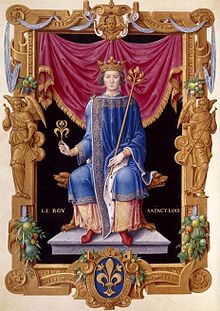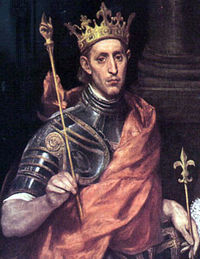St. Louis, King of France
| Saint Louis IX | |
|---|---|

Louis IX by Jean du Tillet at Bibliothèque Nationale
|
|
| King of France (more...) | |
| Reign | 8 November 1226 – 25 August 1270 |
| Coronation | 29 November 1226 in Reims Cathedral |
| Predecessor | Louis VIII |
| Successor | Philip III |
| Born |
25 April 1214 Poissy, France |
| Died | 25 August 1270 (aged 56) Tunis, Tunisia |
| Burial | Basilica of St Denis |
| Spouse | Margaret of Provence |
| Issue among others... |
Isabella, Queen of Navarre Louis of France Philip III of France John Tristan, Count of Valois Peter, Count of Perche and Alençon Blanche, Infanta of Castile Margaret, Duchess of Brabant Robert, Count of Clermont Agnes, Duchess of Burgundy |
| House | Capet |
| Father | Louis VIII of France |
| Mother | Blanche of Castile |
| Religion | Roman Catholicism |
| Saint Louis | |
|---|---|

Saint Louis, painting by El Greco c. 1592 – 95.
|
|
| King of France, Confessor | |
| Born |
25 April 1214 Poissy, France |
| Died | 25 August 1270 (aged 56) Tunis in what is now Tunisia |
| Venerated in | Roman Catholic Church, Anglican Communion |
| Canonized | 11 July 1297 by Pope Boniface VIII |
| Feast | 25 August |
| Attributes | Depicted as King of France, generally with a crown, holding a sceptre with a fleur-de-lys on the end, possibly with blue clothing with a spread of white fleur-de-lys (coat of arms of the French monarchy) |
| Patronage | France, French monarchy, Third Order of St. Francis, Archdiocese of New Orleans, hairdressers; passementiers (lacemakers) |
Louis IX (25 April 1214 – 25 August 1270), commonly known as Saint Louis, was King of France from 1226 until his death. Louis was crowned in Reims at the age of 12, following the death of his father Louis VIII the Lion, although his mother, Blanche of Castile, ruled the kingdom until he reached maturity. During Louis's childhood, Blanche dealt with the opposition of rebellious vassals and put an end to the Albigensian crusade which had started 20 years earlier.
As an adult, Louis IX faced recurring conflicts with some of the most powerful nobles, such as Hugh X of Lusignan and Peter of Dreux. Simultaneously, Henry III of England tried to restore his continental possessions, but was defeated at the battle of Taillebourg. His reign saw the annexation of several provinces, notably Normandy, Maine and Provence.
Louis IX was a reformer and developed French royal justice, in which the king is the supreme judge to whom anyone is able to appeal to seek the amendment of a judgment. He banned trials by ordeal, tried to prevent the private wars that were plaguing the country and introduced the presumption of innocence in criminal procedure. To enforce the correct application of this new legal system, Louis IX created provosts and bailiffs.
According to his vow made after a serious illness, and confirmed after a miraculous cure, Louis IX took an active part in the Seventh and Eighth Crusade in which he died from dysentery. He was succeeded by his son Philip III.
...
Wikipedia
